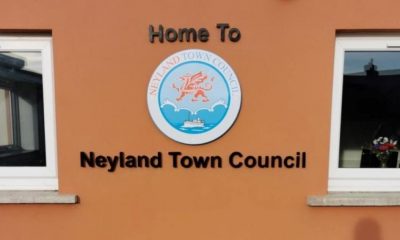News
Rural schools to be protected from closure

 RURAL SCHOOLS in Pembrokeshire are set to receive a boost after the Education Secretary announced new rules which will protect them from closure.
RURAL SCHOOLS in Pembrokeshire are set to receive a boost after the Education Secretary announced new rules which will protect them from closure.
Between 2006-07 and 2015-16, seven state schools in Pembrokeshire were closed due to financial pressures or surplus places.
The Education Secretary, Kirsty Williams, has said that closure will now be considered as a last resort, only once all other options have been considered.
She went on to say that federations with other schools should also be considered.
That has already happened in Pembrokeshire with Tavernspite and Templeton CP Schools becoming a federation.
Two schools in Milford Haven, The Meads Infant and Nursery School and Milford Haven Junior School, are also set to close in 2018 with the aim of creating one new school.
Three rural schools in the Angle peninsula, Angle, Stackpole and Orielton, are also being closed to make way for a new school in Hundleton, but concerns have been raised out transporting kids to the new school.
Under the rules, authorities must now consider the impact of closure on a child’s education, the wider community and travel arrangements.
They will also have to explain why closure would be seen as the best option.
Speaking in 2016, Kirsty Williams said: “Small and rural schools play an important role in our national mission in raising standards and extending opportunities for all our young people.
“Pupils in rural schools deserve the same opportunities as children in other areas of Wales. However, they face particular challenges including small pupil numbers, budget and resource pressures and greater difficulty in recruiting head teachers and teaching staff.
“Let me be clear – this isn’t simply about keeping all schools open. This is about raising standards in all of our schools, no matter where they are based, and ensuring all schools get a fair hearing when their future is being considered.
“These changes set out a presumption against closing rural schools and new incentives for rural schools to link up and work together for the benefit of both teachers and pupils. I want to see rural schools working more formally together and across the country, forming federations and looking into the possibility of sharing buildings with other services to ensure school buildings remain viable.”
Responding to the new rules, Llyr Gruffydd, Plaid Cymru shadow education secretary, said: “I welcome the commitment by the government to consider all options and consult fully before closing any school. The change of direction should mean less pressure on councils to close rural school. Previously the emphasis was on dealing with ’empty places’, which meant that councils were forced to close rural schools. There was no flexibility to cope with variations in population that happen in rural communities periodically. That is the nature of rural communities.
“But, if the government wants to assert keep small schools open, it must also recognise the additional cost for councils at a time of hardship and cuts. I will be seeking assurances that the new Code here means money will not be lost for our more urban schools. The £2.5m funding promised amounts to just £110,000 for every county in Wales – that will not go very far.
“The new code offers an opportunity to ensure the community has a greater voice and, if local people want to keep the school open or federate, then the Welsh Government should respect that opinion wherever possible to ensure the best education for our children.
“That said, the new Code does not mean that rural schools will not be closed and each must be considered individually. I really hope that we see a situation where thriving rural schools are never closed again. Full details of the plan will need to be scrutinise of course before reaching a final judgement about what is being offered.”
Entertainment
Paws-ibly dog-free show comes to Torch Theatre

ACCLAIMED theatre-maker Sam Freeman is bringing We’re Not Getting A Dog to the Torch Theatre in Milford Haven this February — a new, comic, roughly 72-minute solo show packed with domestic observation and a quietly rueful bite.
Told through passive-aggressive letters, early-morning jet-washing and the small rituals we cling to in an effort to make a house feel like a home, the production casts a wry eye on what it means to live close to other people — neighbours we see every day, yet barely know.
“It’s really hard to describe the show,” Freeman said. “I guess it’s best to imagine a really gorgeous Radio 4 late-night comedy, but performed live — it’s heart-warming and like being wrapped in a warm hug. It’s a show to warm the soul.”

The performance weaves multiple storylines together: a couple sprinting through rain to catch a bus, a man staring at a blank laptop screen in despair, and a woman opening an envelope to reveal a photograph. Each moment builds towards a bigger picture, drawing the audience into a narrative where not everything is as straightforward as it first appears.
“It’s a real joy to perform because you let this story unfold,” Freeman added. “You see these moments where people laugh, occasionally cry, but also join the dots and discover that not everything is as simple as it first may seem.”
Read from a little black book, the show has been described as a hidden gem — a quietly powerful and comic examination of home, connection and distance.
And for anyone wondering about the dog on the poster, Freeman has an answer.
“Everyone wants to know about the dog on the poster… It’s my border terrier Poppy — absolute psychopath,” he said. “Whether she makes it into the show… well… you’ll have to see it to find out.”
We’re Not Getting A Dog will be performed at the Torch Theatre on Saturday, 14 February at 7.30pm. Tickets are £8. For more information, visit the Torch Theatre website or contact the Box Office on (01646) 695267.
Health
Hywel Dda board to consider refreshed health strategy to 2040

New plan promises more care closer to home, ‘Digital First’ services, and stronger focus on prevention
HYWEL DDA UNIVERSITY HEALTH BOARD will consider a refreshed version of its long-term health and care strategy at a public board meeting on Thursday (Jan 29).
The proposed strategy, titled A Healthier Mid and West Wales – Healthier lives, well lived, sets out the Health Board’s priorities up to 2040 and updates ambitions first published in 2018.
Health chiefs say the refreshed plan does not change Hywel Dda’s core aim of helping people live healthier lives for longer, with a stronger emphasis on preventing ill-health and supporting people to stay well. Instead, it updates the strategy to reflect changing needs across the region, alongside wider pressures on health and care services including rising demand and the lasting impact of the COVID-19 pandemic.
The strategy sets out how clinical developments, new digital tools and community facilities could provide more opportunities to offer help earlier and closer to home, while outlining how services may need to adapt in the years ahead.
Hywel Dda said the draft refresh has been shaped by engagement with communities, staff and partners across Carmarthenshire, Ceredigion and Pembrokeshire. The engagement took place in two phases between July and November 2025 and involved almost 3,000 people.
Residents were asked what matters most to them in living a healthier life, as well as being invited to share views on priorities for health and care. The Health Board said feedback was used to develop four key themes which underpin the refreshed strategy: thriving teams, healthier communities, great care and positive futures.
During the engagement, people consistently raised concerns about the distance they have to travel to access healthcare. The Health Board said the refreshed strategy aims to deliver more care closer to where people live, with greater support in communities and at home.
The plan also outlines an expanded role for digital services, including easier access to advice, appointment booking and test results. The Health Board said it intends to create a ‘Digital First’ service designed to connect homes, communities and hospitals.
The refreshed strategy also builds on work started in 2018 on a Social Model for Health and Wellbeing, which aims to shift services away from mainly reacting to illness and towards preventing ill-health earlier, with prevention described as a central priority for improving health and reducing long-term demand.
Hywel Dda Chief Executive Professor Phil Kloer said: “Our communities have been clear about what matters most to them. People want fair access to care, strong local services, and support to stay well in their daily lives.
“This proposed strategy refresh is about listening to that feedback and setting a clear direction for how we work together over the next 15 years. Our strategy focuses on health and keeping people well, not just treating illness.
“It is also guided by our values of belonging, growth and working together. These values continue to emphasise the importance of putting people first, improving our services, and supporting each other to deliver the best care possible.
“We will continue to work with our communities and the individuals who play a vital role in shaping our social model for health and wellbeing.”
Lee Davies, Hywel Dda’s Executive Director of Strategy and Planning, said delivering the refreshed plan would require “a more radical approach” to how care is provided.
He said: “The principles of our 2018 strategy remain the same, but the world around us has changed. This refresh ensures our vision, goals and priorities reflect today’s challenges and opportunities.
“We will continue to move towards prevention, wellbeing and primary and community care, supported by digital solutions where appropriate. Most importantly, it shows how what people told us is being reflected in our plans.”
The Health Board said that if the refreshed strategy is approved, it will be finalised and published in multiple accessible formats. Work with communities, staff and partners would continue as delivery plans are developed, and the strategy would be regularly reviewed to reflect changes and developments in health needs across the region.
Health
Withybush staff fear crèche fee rise will price parents out

50% jump from March as Health Board says charges must increase to maintain “high-quality care”
WITHYBUSH HOSPITAL staff with young children have raised concerns over a steep rise in crèche fees which they say could leave some parents questioning whether it is worth staying in work.
Hywel Dda University Health Board has confirmed the hourly rate at the Withybush Crèche will increase from £4.50 per hour to £6.50 per hour from March 2026.
Parents told The Herald the increase will hit families with children under three particularly hard, as they do not qualify for the same level of childcare support available to older children.
One parent of a two-year-old said the change could add around £450 a month for parents using the service five days a week, warning that once childcare is taken into account, their partner — who works in an administrative role at the hospital — would effectively be “working for £20 a day”.
In a statement, Andrew Carruthers, Chief Operating Officer at Hywel Dda University Health Board said: “From March 2026, we will need to increase the hourly rate for our childcare fees at Withybush Crèche from £4.50 per hour to £6.50 per hour, which is broadly in line with other local service providers. Our fees have remained the same for several years, but to continue to provide the high-quality care children attending our crèche deserve, we now need to make this adjustment.
“This decision has not been taken lightly and follows a rigorous review into how we could offer best value for money for parents using the service.
“We have sent letters to parents explaining the changes and are inviting parents who have any questions or would like to talk this through to get in touch with us.”
-

 News7 days ago
News7 days agoWhitland Post Office to reopen under new management in March
-

 News2 days ago
News2 days agoMilford Haven man expelled from Russia amid spy allegations
-

 News4 days ago
News4 days agoCampaigners threaten judicial review over state pension redress talks
-

 Local Government7 days ago
Local Government7 days agoCouncillor suspended for four years after tribunal finds code breaches
-

 Crime7 days ago
Crime7 days agoChristopher Phillips jailed for life for “grotesque” sexual violence against baby
-

 Community6 days ago
Community6 days agoA generous character remembered after death of scaffolding boss Jozef Polak
-

 Local Government3 days ago
Local Government3 days agoFinal budget published with £1.2bn uplift for Wales
-

 Community4 days ago
Community4 days agoJenkins & Davies investigating alleged racist remarks after video circulates online



























